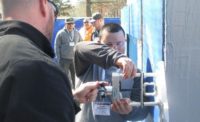The Air Barrier Association of America (ABAA), a national trade organization specializing in air barriers, is pleased to announce the launch of the industry’s first Certified Air Barrier Specialist Program; CABS.
The objective of the Certified Air Barrier Specialist program is to ensure that a professional has the knowledge to give building stakeholders a consistent message on the requirements for air barrier systems; including the selection of air barrier materials and accessories, the proper installation instructions for those materials, any drawings or specifications related to an air barrier system, and proper testing for ABAA-evaluated air barrier assemblies and job site conditions.
“In the early stages, we did not have a way to test every aspect of an air barrier knowledge, but we’ve since evolved to offering programs that vet manufacturers, assemblies, contractors and installers. And, for the first time ever, air barrier specialists,” explained ABAA Executive Advisor Roy Schauffele, FCSI, CCPR, FABAA, CABS. “this is bringing a new level of legitimacy to the industry.”
The program is designed for any professional who advises on air barrier assemblies. This could range from architects to inspectors/auditors and other building stakeholders involved in the use, design, and installation of air barriers. The key knowledge units in the program address every aspect of the air barrier industry: construction site requirements, materials methods & details, project design and on-site testing.
“The development of CABS came from an existing market need for a certification program geared towards those involved in the air barrier industry who may not be installers, manufacturers, or contractors, or an easily-defined profession,” Schauffele explained.
By having an Air Barrier Specialist certification from an accredited organization like the Air Barrier Association of America (ABAA), a professional would be able to demonstrate their expert knowledge of air barriers across five major air barrier methods: board stock, fluid-applied, mechanically attached, self-adhered, and spray foam. This level of validity has never been offered for general air barrier “experts” or broader industry professionals before.
Additionally, the CABS program is managed in accordance with ISO 17024 standards, a comprehensive set of requirements to ensure a robust certification program. Recognized around the world, the ISO accreditation enables you to showcase the program to US government organizations, such as the General Services Administration, with a legitimate certification recognized across state and national jurisdictions.
“Accreditation is third-party confirmation that our certifications are developed to rigorously high standards and that our best practices are recognized worldwide,” explained Ryan Dalgleish, Chief Operating Officer of the Air Barrier Association of America.
The CABS program recommends a minimum of 5 years of industry experience, along with ABAA Continuing Education units (CEU), before registering for the program. In full adherence to COVID-19 guidelines set forth by the CDC, the exam is proctored and administered online by a third party and is monitored through webcam & screenshare. There will be between 145-171 multiple choice questions and a passing grade of 80%.
Certification is valid for a period of three years, and recertification does not require a retest—just proof of ABAA and AIA LUs/CEUs. Interested candidates can learn more at airbarrier.org.






